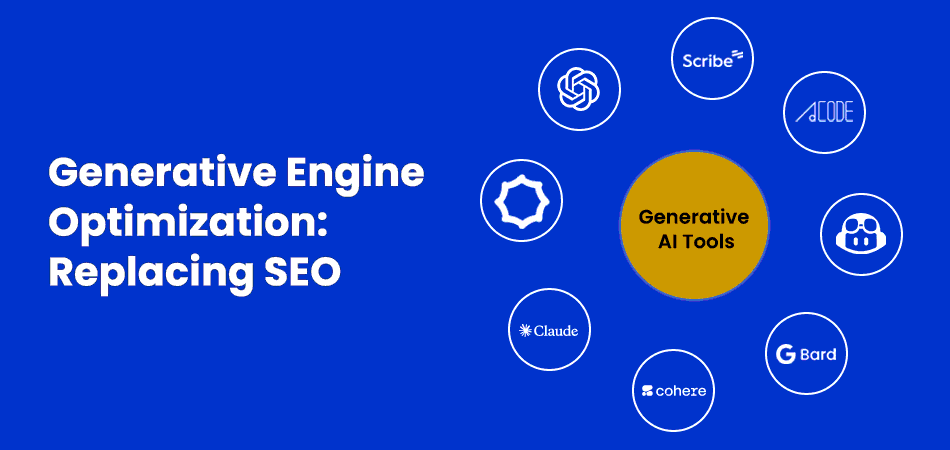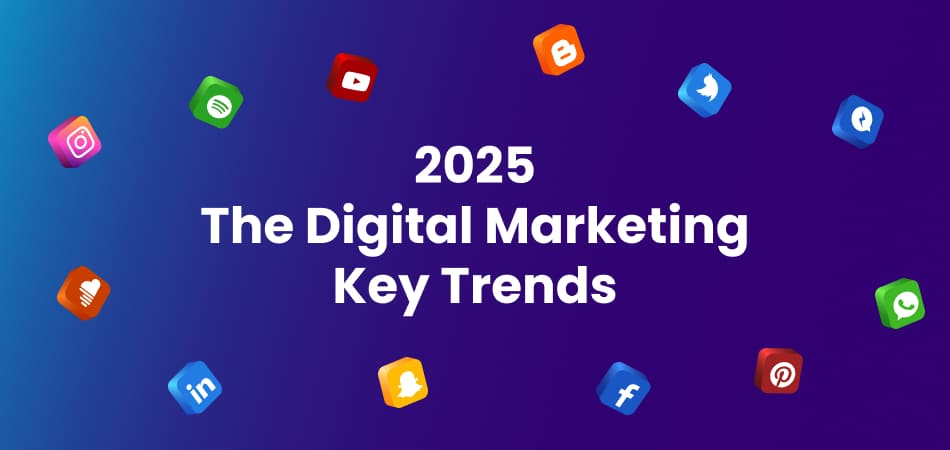People’s online search habits are changing quickly! There are other options besides traditional SEO, which concentrated on ranking websites on search engines like Google. Generative Engine Optimization (GEO) is a newcomer. GEO is designed to optimize content for AI-powered generative engines like ChatGPT, Google Gemini, Bing Copilot, and more.Instead of leading users to a website, generative engines deliver instant, direct answers. GEO prioritizes conversational content, semantic depth, and voice-friendly responses because of this. While traditional SEO finds it difficult to compete in this new zero-click era, it is rapidly emerging as the secret to success in AI-driven search environments.
Introduction: The Evolution from SEO to GEO
For many years, search engine optimization, or SEO, has been the mainstay of online visibility. Increasing website traffic and clicks by ranking highly on Google’s search engine result pages (SERPs) was the clear goal.
But the landscape of search is rapidly evolving.
With the rise of voice search, generative AI like ChatGPT and Google Gemini, and AI assistants, users now prefer instant, conversational responses over endless search results.
This is where Generative Engine Optimization (GEO) shines.
What is Generative Engine Optimization (GEO)?
Generative engine optimization, or GEO, is the process of making your content easier for AI-powered generative engines to find, understand, and display.
Unlike SEO, which involves users clicking on links on websites, GEO ensures that your content appears directly in AI chatbots, voice assistants, and conversational search platforms.
Popular Generative Engines:
- ChatGPT
- Google Gemini
- Bing Copilot
- Perplexity AI
These engines don’t display lists of web pages like Google—they deliver instant answers.
Why is GEO Important?

The way people search is shifting from typing queries to speaking or chatting with AI.
Users now want immediate answers.
Voice assistants like Alexa, Siri, and Google Assistant are widely used.
Google’s Search Generative Experience (SGE) integrates AI-generated answers into search results.
The trend is clear:
Zero-click searches are increasing.
If your content isn’t optimized for generative engines, it may never be seen.
GEO vs. SEO: The Big Difference
| Feature | Traditional SEO | Generative Engine Optimization (GEO) |
| Goal | Rank on Search Engines | Appear in AI-Generated Answers |
| Search Journey | Click on Search Result Pages | Direct AI Responses, Zero Clicks |
| Optimization Focus | Keywords, Backlinks, On-page SEO | Semantic Relevance, Conversational Content |
| User Behavior | Website Browsing | Voice Search, AI Chat |
| Tools | Google Search Console, SEMrush | Structured Data, Topic Clustering, Voice Optimization |
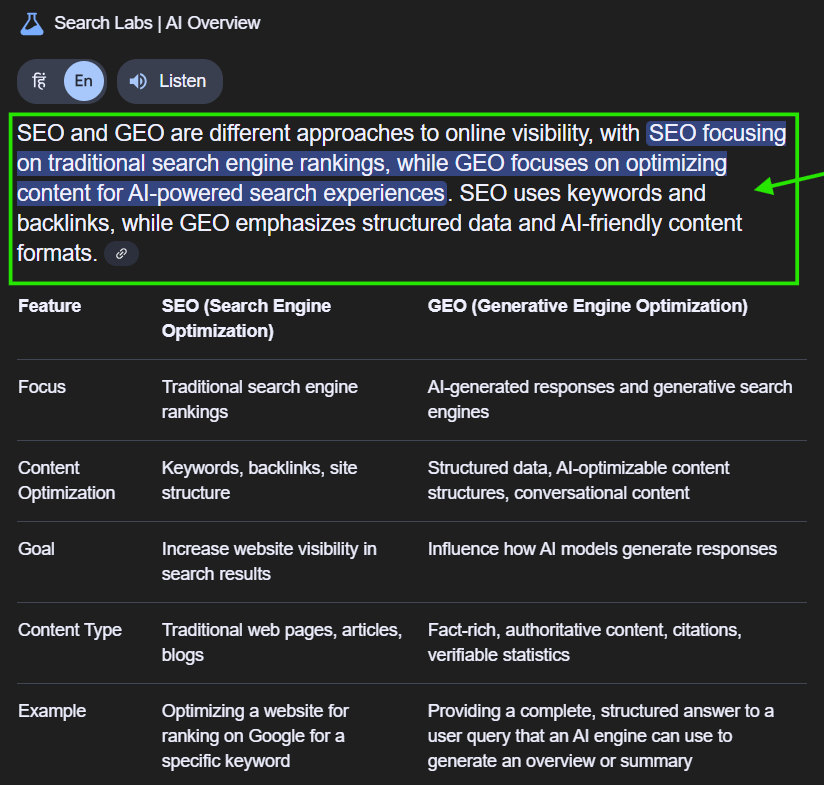
How Does GEO Work?
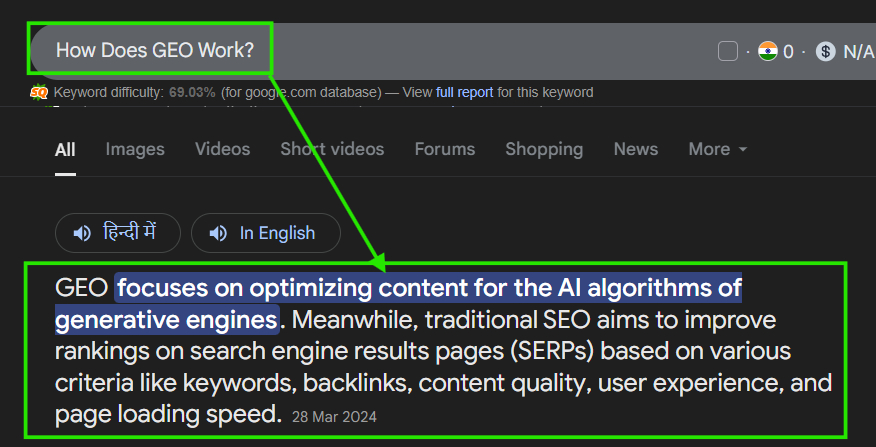
1. Focus on Semantic Search
Generative engines thrive on meaningful, topic-rich content.
It’s not about keywords anymore—it’s about context.
- Build topic clusters
- Cover related subtopics in depth
- Connect internal content seamlessly
2. Write Conversational Content
Generative engines prefer natural, easy-to-read language.
- Use FAQs
- Create content that sounds like a conversation
- Write voice-search-friendly answers
3. Use Structured Data and Schema Markup
Structured data helps AI engines quickly understand and extract your content.
- Add FAQ schema
- Use bullet points, tables, and clear headings
- Apply proper metadata
Why GEO Will Replace Traditional SEO
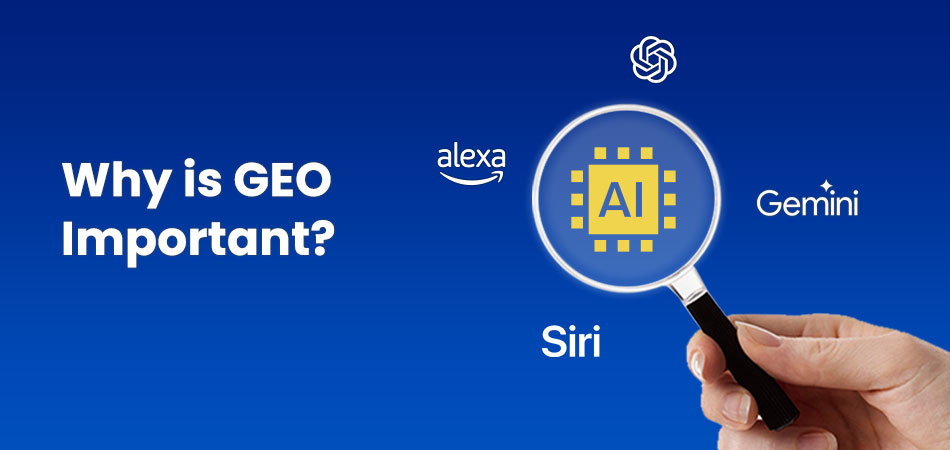
AI is the new search gateway
Users are shifting from web searches to:
- ChatGPT
- Alexa and Siri
- Google Gemini
They want direct, quick answers—not long lists of links.
Google’s Search is Evolving
Google’s Search Generative Experience (SGE) is now showing AI-generated answers before traditional search results, which means even ranking #1 in SEO may not guarantee visibility anymore.
Rise of Zero-Click Searches
Over 50% of Google searches already result in no clicks.
This number is expected to grow as AI chatbots and voice searches dominate.
How to Optimize for GEO
Write conversational content that directly answers user questions.
Create topic clusters to build deep, connected content
Use structured data and schema markup
Optimize for voice search with natural-sounding language
Focus on user intent and semantic relevance rather than keyword stuffing
Will GEO Completely Replace SEO?
Not entirely!
SEO will still be important for:
- Local search
- E-commerce product listings
- Transactional queries
However, GEO will dominate AI-driven, zero-click, and conversational search results.
If you don’t adapt, you risk losing your digital visibility.
Frequently Asked Questions (FAQs)
What is Generative Engine Optimization (GEO)?
Generative Engine Optimization (GEO) is the process of optimizing content for AI-powered generative engines like ChatGPT, Google Gemini, and Bing Copilot. It focuses on making content easy for AI to retrieve and generate direct answers.
How is GEO different from SEO?
SEO focuses on improving website rankings on search engines, while GEO optimizes content for AI-generated answers. SEO relies on keywords and backlinks, but GEO prioritizes semantic depth, conversational content, and voice search relevance.
Why is GEO important for the future of search?
More users are now using AI chatbots and voice search instead of browsing search engine results. GEO ensures your content is visible in AI-generated answers, which is becoming the new front door to search.
Will GEO completely replace SEO?
No. SEO will still be useful for certain web searches, local SEO, and transactional keywords. However, GEO will dominate AI-driven and conversational searches.
How can I optimize my content for GEO?
To optimize for GEO, write conversational content, use structured data, create voice-friendly answers, build topic clusters, and focus on answering user questions directly.
Does Google use Generative Engine Optimization?
Yes. Google’s Search Generative Experience (SGE) already uses AI to generate direct answers. GEO helps ensure your content is included in those AI-generated responses.
Final Thoughts
So, What is Generative Engine Optimization (GEO) and How It Will Replace SEO?
GEO is not just a trend—it’s the future of search.
It’s the bridge to connect your content with AI engines like ChatGPT, Google Gemini, and Bing Copilot.
It’s essential to stay visible in a world where clicks are vanishing, and conversations are taking over.
Start optimizing for GEO now and lead the next generation of search!
Final Thoughts
So, What is Generative Engine Optimization (GEO) and How It Will Replace SEO?
GEO is not just a trend—it’s the future of search.
It’s the bridge to connect your content with AI engines like ChatGPT, Google Gemini, and Bing Copilot.
It’s essential to stay visible in a world where clicks are vanishing, and conversations are taking over.
Start optimizing for GEO now and lead the next generation of search!
